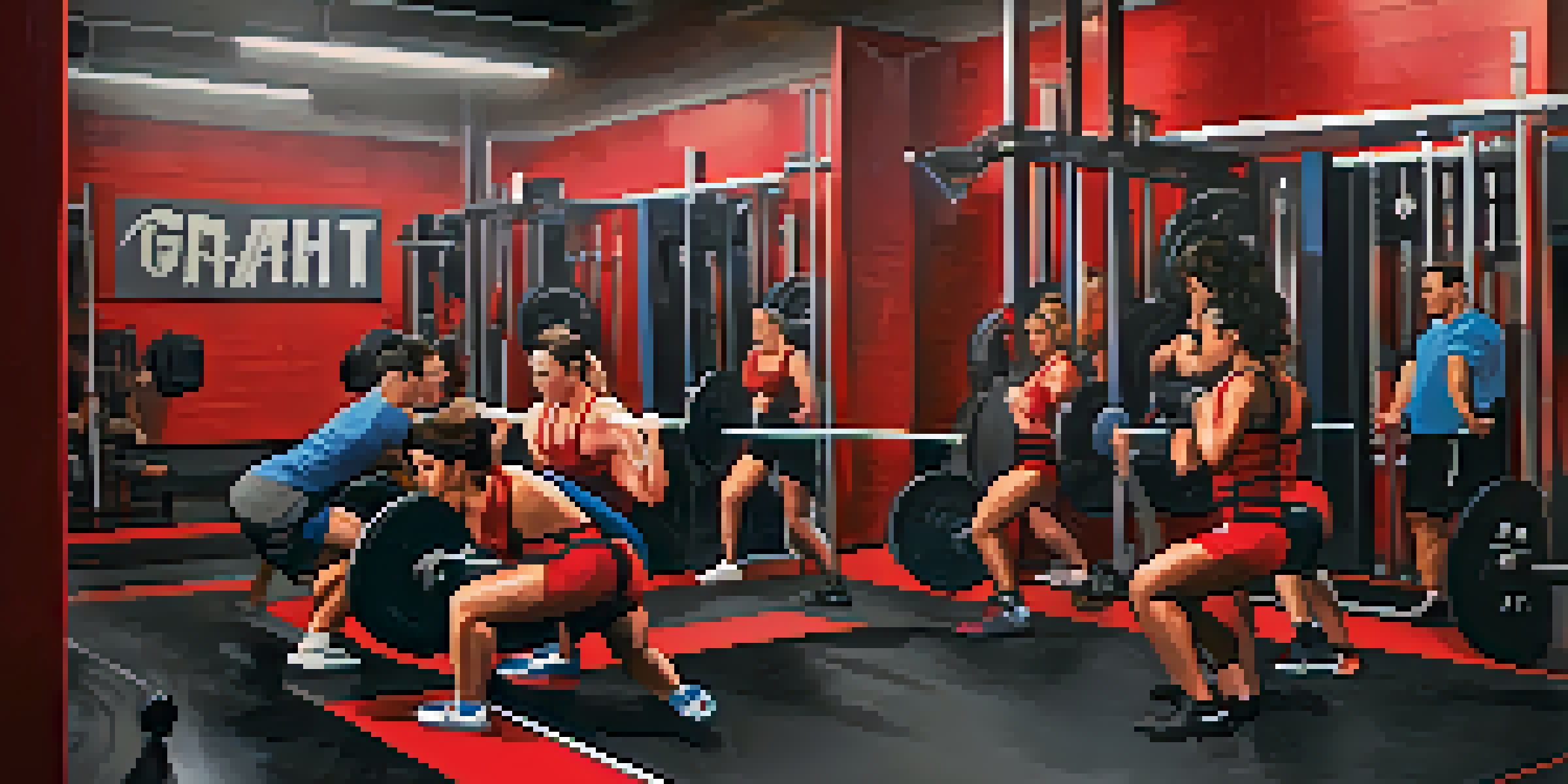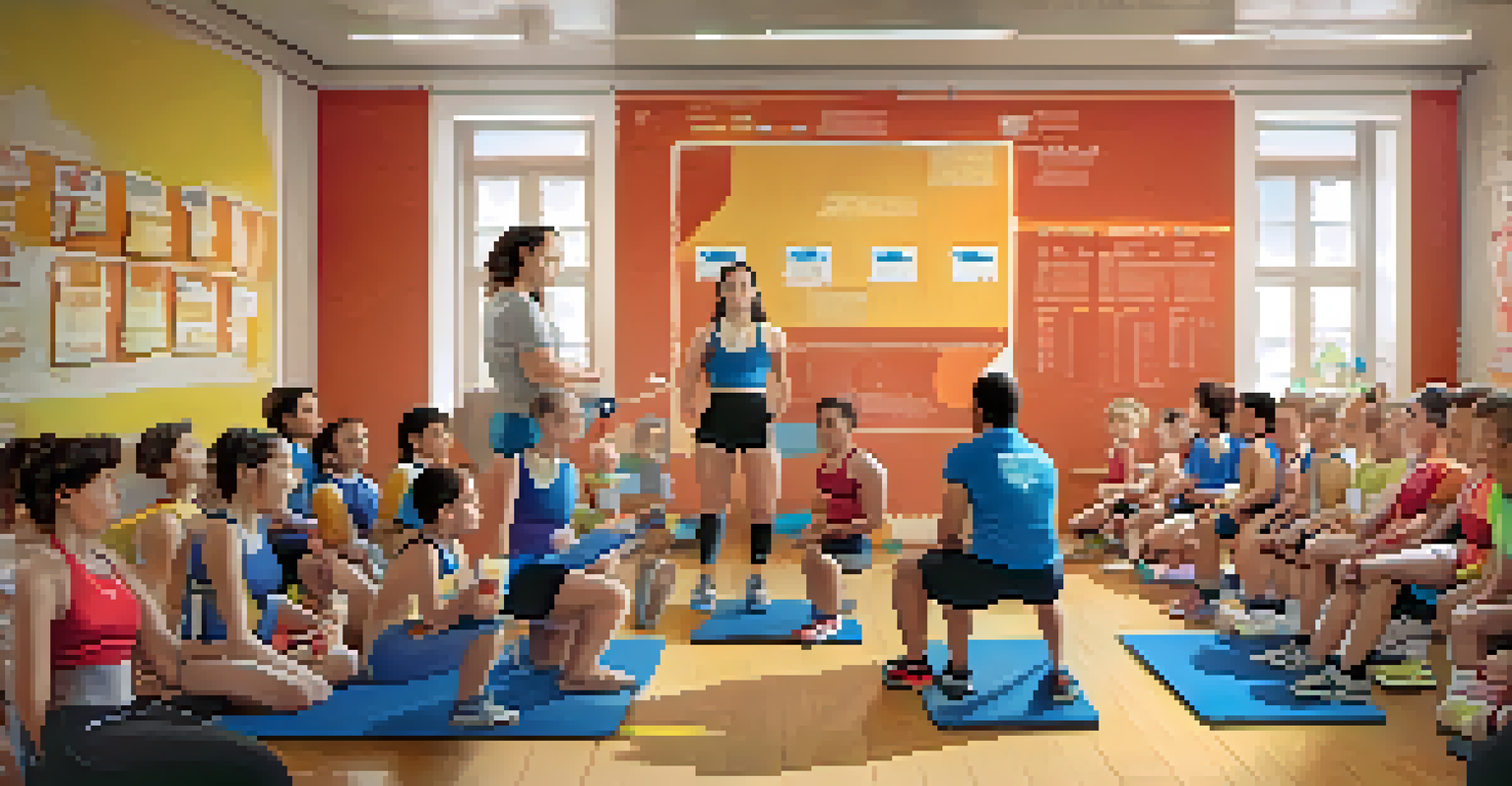Understanding the Link Between Powerlifting and Eating Disorders

What is Powerlifting and Its Appeal?
Powerlifting is a strength sport focusing on three main lifts: the squat, bench press, and deadlift. Many are drawn to powerlifting because it emphasizes raw strength and measurable progress, which can be incredibly rewarding. The community surrounding powerlifting often fosters camaraderie and support, making it an attractive environment for those looking to improve their physical prowess.
Strength does not come from physical capacity. It comes from an indomitable will.
However, this pursuit of strength can sometimes lead to an unhealthy obsession with body image and weight. Lifters may feel pressured to meet certain weight classes, potentially influencing their eating habits. This pressure can create a dangerous mindset where performance is prioritized over overall health and well-being.
Ultimately, the appeal of powerlifting lies in its challenge and community, yet it's essential to recognize the potential pitfalls that can arise when athletes focus solely on performance metrics.
The Pressure of Weight Classes in Powerlifting
In powerlifting, athletes compete in specific weight classes, which can create an intense focus on body weight. This competition can lead individuals to adopt restrictive eating habits to fit into their desired weight category. While some may see short-term success, these practices can spiral into unhealthy eating patterns.

The desire to excel in their sport can push athletes towards extreme measures, such as excessive dieting or unhealthy weight-cutting practices. This behavior may not only harm their physical health but can also impact their mental well-being. The fear of failing to meet weight requirements can exacerbate feelings of anxiety and self-doubt.
Powerlifting's Community and Challenges
While powerlifting offers a supportive community, it can also lead to unhealthy body image obsessions and eating habits.
Understanding the implications of weight classes is crucial for athletes and coaches alike. Promoting a balanced approach to nutrition and body image can help mitigate these pressures.
The Role of Body Image in Powerlifting
Body image plays a significant role in the lives of many powerlifters, often influencing their self-esteem and motivation. Athletes may feel compelled to conform to certain body ideals that are celebrated within the sport, which can lead to negative self-perception. This fixation on appearance can overshadow the more important aspects of strength training and personal achievement.
The greatest wealth is health.
For some, the drive to achieve a certain physique can lead to disordered eating patterns. These patterns may manifest as binge eating, restrictive diets, or obsessive calorie counting, all of which can be detrimental to both physical and mental health. It's vital to understand that strength should be the focus, rather than fitting into a specific body image mold.
Encouraging a positive body image and self-acceptance can help athletes focus on their performance rather than their appearance, fostering a healthier relationship with food and exercise.
Signs of Eating Disorders Among Powerlifters
Recognizing the signs of eating disorders in powerlifting can be challenging, as they often manifest subtly. Changes in eating habits, withdrawal from social activities, and preoccupation with weight can all be red flags. These behaviors may indicate that an athlete is struggling with their relationship to food and body image.
Additionally, a shift in training focus from performance to body weight can signal an unhealthy mindset. If an athlete begins to prioritize their weight over their strength, it can lead to an unhealthy cycle that affects both their physical health and mental state. Coaches and peers should be vigilant and supportive, offering help when needed.
Impact of Weight Classes
Competing in specific weight classes can pressure athletes into restrictive eating behaviors that harm their health.
Early intervention is key in addressing eating disorders. By fostering an open, understanding environment, athletes can feel safe discussing their struggles and seeking help.
The Psychological Impact of Eating Disorders
Eating disorders can have a profound psychological impact on individuals, particularly in high-pressure environments like powerlifting. Athletes may experience anxiety, depression, and low self-esteem as a result of their eating habits. These feelings can create a vicious cycle, further fueling disordered eating and affecting overall performance.
The mental toll of striving for an ideal body or weight can detract from the joy of lifting. It's essential for powerlifters to remember that their worth is not solely defined by their weight or performance metrics. Building a supportive community that emphasizes mental health alongside physical strength can promote well-being.
Addressing the psychological aspects of eating disorders is crucial for recovery. Encouragement and understanding from peers can make a significant difference in an athlete's journey.
Promoting Healthy Eating Habits in Powerlifting
Promoting healthy eating habits within the powerlifting community is essential for preventing eating disorders. Athletes should be encouraged to focus on balanced nutrition rather than restrictive diets. Emphasizing the importance of fueling the body for performance can create a healthier perspective on food.
Coaches and trainers play a pivotal role in shaping these habits. By prioritizing education on nutrition and overall well-being, they can help athletes develop a healthier relationship with food. This approach can foster an environment where performance is celebrated without compromising health.
Need for Healthy Eating Focus
Promoting balanced nutrition and mental health awareness is vital for preventing eating disorders in powerlifting.
Creating workshops or resources on nutrition can empower athletes to make informed choices. Encouraging open discussions about body image and mental health can further support a positive culture within the sport.
Resources for Athletes Facing Eating Disorders
For athletes struggling with disordered eating, seeking help is crucial. Numerous resources are available, including counseling services, support groups, and nutritionists who specialize in sports-related issues. Finding a professional who understands the unique pressures of powerlifting can provide tailored support.
Additionally, online communities and forums can offer a sense of belonging for those facing similar challenges. Sharing experiences and advice can be incredibly therapeutic for athletes feeling isolated in their struggles. Remember, reaching out for help is a sign of strength, not weakness.

Creating a culture that prioritizes mental health and well-being is essential for the future of powerlifting. By encouraging athletes to seek support, we can help them navigate their challenges and thrive in both strength and health.